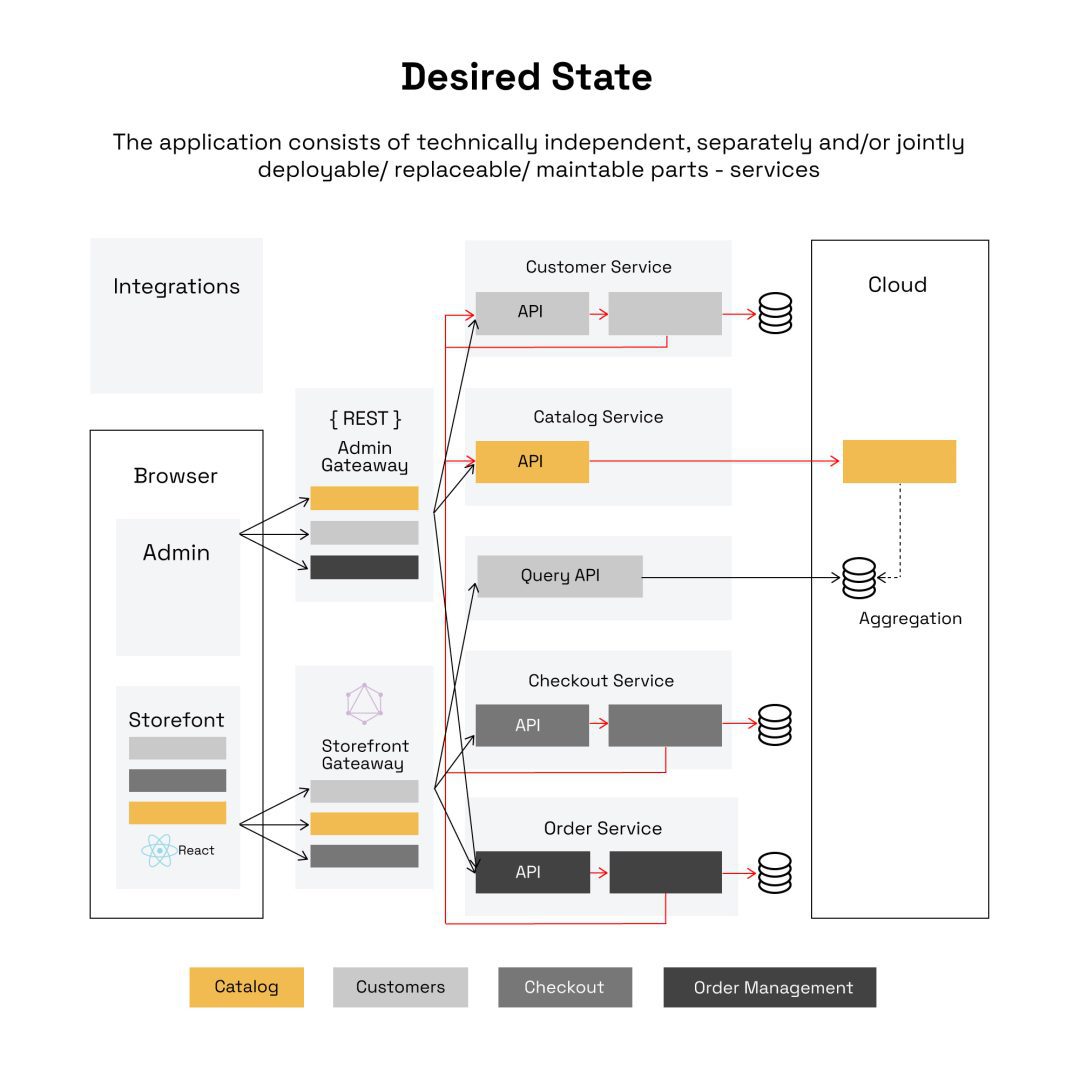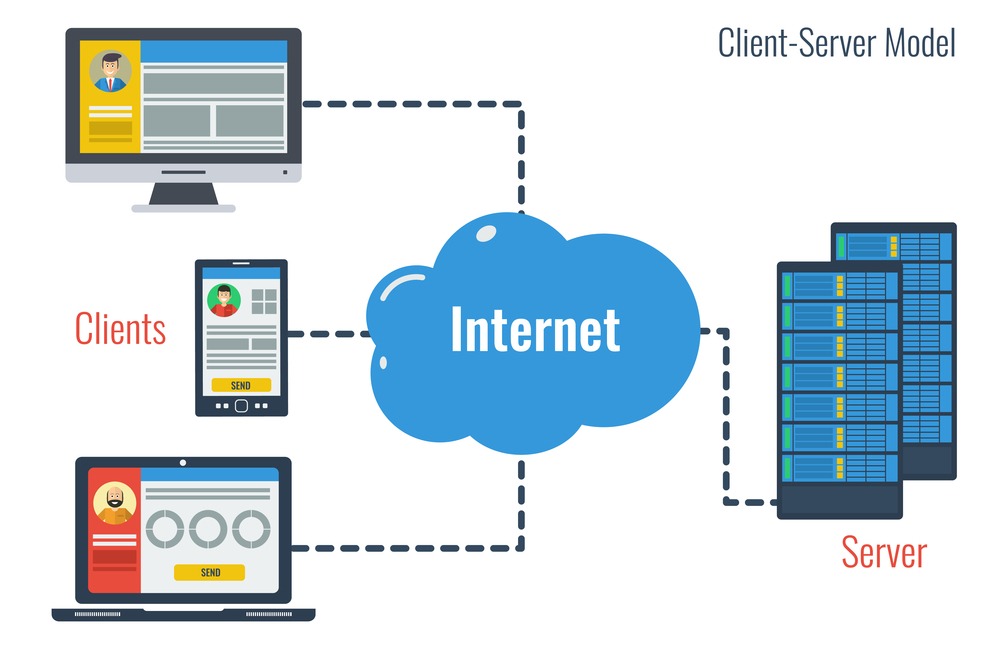Understanding E-commerce Infrastructure

Source tech-talk.org
When it comes to e-commerce infrastructure, there are several key components that make up the technology stack that powers online businesses. These components include web hosting, payment gateways, shopping carts, SSL certificates, and content management systems, among others. Let's take a closer look at each of these elements and how they contribute to the overall functionality of an e-commerce website.
First and foremost, web hosting is essential for any online business. This is the service that allows your website to be accessible on the internet. Without a reliable web hosting provider, your website may experience downtime, slow loading times, and other issues that can negatively impact the user experience. It's important to choose a web hosting provider that offers scalability, security, and excellent customer support.
Payment gateways are another critical component of e-commerce infrastructure. These are the services that allow customers to securely submit their payment information when making a purchase online. Payment gateways encrypt sensitive data to ensure that it is transmitted securely over the internet. Popular payment gateways include PayPal, Stripe, and Authorize.Net.
Shopping carts play a crucial role in the online shopping experience. These are software applications that allow customers to browse products, add items to their cart, and complete the checkout process. A user-friendly shopping cart can help increase conversions and drive sales for your e-commerce business.
SSL certificates are essential for securing online transactions. These certificates encrypt data transmitted between a user's browser and your website, ensuring that sensitive information such as credit card details is protected from hackers. Having an SSL certificate also helps build trust with customers and can improve your website's search engine rankings.
Content management systems (CMS) are tools that allow you to manage and update the content on your e-commerce website. Popular CMS platforms such as WordPress, Magento, and Shopify make it easy to add new products, create blog posts, and customize the look and feel of your site. A user-friendly CMS can help streamline your e-commerce operations and improve the overall user experience.
In conclusion, e-commerce infrastructure is a critical component of any online business. By investing in reliable web hosting, secure payment gateways, user-friendly shopping carts, SSL certificates, and a robust content management system, you can create a seamless and secure shopping experience for your customers. It's essential to stay up to date with the latest technologies and trends in e-commerce infrastructure to ensure that your online business remains competitive in the digital marketplace.
Importance of a Strong E-commerce Infrastructure

Source oroinc.com
Having a robust e-commerce infrastructure is crucial for online businesses to operate efficiently, securely, and effectively. An e-commerce infrastructure consists of the hardware, software, network, payment gateways, and security measures that are needed to support online transactions. Without a strong infrastructure in place, businesses may encounter technical issues, security vulnerabilities, and poor user experiences.
One of the key reasons why a strong e-commerce infrastructure is important is because it ensures the smooth operation of an online store. When customers visit an e-commerce website, they expect fast loading times, secure payment processing, and a seamless shopping experience. If the infrastructure is weak or unreliable, customers may experience slow website performance, payment errors, or even security breaches. This can lead to a loss of trust in the business and ultimately result in lost sales.
Additionally, a strong e-commerce infrastructure is essential for data security and protection. Online businesses collect sensitive customer information, such as credit card details and personal data, during the checkout process. It is imperative that this data is stored securely and protected from cyber threats. A robust infrastructure includes encryption protocols, firewalls, and secure servers to safeguard customer information and prevent data breaches.
Furthermore, an e-commerce infrastructure plays a crucial role in scalability and growth. As an online business expands and attracts more customers, the infrastructure must be able to handle increased traffic and transactions. Without a scalable infrastructure, businesses may experience website crashes, slow loading times, and outages during peak periods. This can not only impact the user experience but also hinder the business's ability to capitalize on sales opportunities and grow their customer base.
In conclusion, a strong e-commerce infrastructure is vital for the success of online businesses. It ensures smooth operations, data security, scalability, and ultimately, customer satisfaction. By investing in a robust infrastructure, businesses can enhance their online presence, build trust with customers, and drive growth and profitability in the competitive e-commerce landscape.
Key Components of E-commerce Infrastructure

Source bi-kring.nl
When setting up an e-commerce store, it's important to consider the key components of e-commerce infrastructure that will ensure the smooth operation of your online business. Here are the essential elements you need to have in place:
1. Web Hosting: Web hosting is the service that allows your website to be accessible on the internet. It is where all of your website's files, images, and databases are stored. Choosing the right web hosting provider is crucial for ensuring your website loads quickly and is always available to customers. Look for a hosting provider that offers reliable uptime, fast servers, and good customer support.
2. Payment Gateways: Payment gateways are the tools that allow you to accept online payments from customers. They securely process credit card transactions, ensuring that your customers' financial information is protected. Popular payment gateways include PayPal, Stripe, and Square. Make sure to choose a payment gateway that is easy to integrate with your e-commerce platform and offers competitive transaction fees.
3. SSL Certificates: SSL (Secure Sockets Layer) certificates are essential for encrypting the data exchanged between your website and your customers' browsers. This encryption ensures that sensitive information such as credit card details and personal data is secure from hackers. Having an SSL certificate also boosts customer trust and can improve your website's search engine rankings. Make sure to install an SSL certificate from a trusted certificate authority to protect your customers' data.
4. Inventory Management Systems: An inventory management system is crucial for keeping track of your product stock levels, orders, and shipments. It helps you manage your inventory efficiently, prevent stockouts, and streamline your order fulfillment process. Look for an inventory management system that integrates seamlessly with your e-commerce platform and provides real-time updates on your inventory levels.
By ensuring that you have these key components of e-commerce infrastructure in place, you can set up a secure and efficient online store that provides a great shopping experience for your customers. Invest in reliable web hosting, secure payment gateways, SSL certificates, and a robust inventory management system to set your e-commerce business up for success.
Investing in E-commerce Infrastructure

Source www.designveloper.com
When it comes to running a successful online business, having a solid e-commerce infrastructure is key. Investing in the right tools, technologies, and platforms can make a big difference in how your business operates and grows. From the initial setup of your online store to ongoing maintenance and updates, e-commerce infrastructure plays a crucial role in the success of your business.
One of the main benefits of investing in e-commerce infrastructure is increased sales. A well-designed and user-friendly online store can attract more customers and encourage them to make purchases. With a seamless checkout process, secure payment options, and fast loading times, you can provide a positive shopping experience for your customers and increase your conversion rate.
Another advantage of investing in e-commerce infrastructure is improved customer satisfaction. By offering a smooth shopping experience, personalized recommendations, and responsive customer support, you can build trust with your customers and create loyal relationships. Happy customers are more likely to return to your online store and recommend your products to others, leading to increased sales and growth for your business.
Furthermore, investing in e-commerce infrastructure can help your business achieve long-term growth. By staying up to date with the latest technologies and trends, you can adapt to changing market conditions and continue to meet the needs of your customers. Whether it's implementing new features, optimizing your website for mobile devices, or integrating with social media platforms, investing in e-commerce infrastructure can help your business stay competitive and expand its reach.
In conclusion, investing in high-quality e-commerce infrastructure is essential for the success of online businesses. By prioritizing the design, functionality, and performance of your online store, you can attract more customers, improve customer satisfaction, and achieve long-term growth. Whether you're just starting out or looking to expand your online presence, investing in e-commerce infrastructure is a smart decision that can pay off in the long run.
Choosing the Right E-commerce Infrastructure for Your Business

Source adsofbrands.net
When it comes to selecting the right e-commerce infrastructure for your business, there are several important factors to consider. One of the key considerations is scalability. Your e-commerce platform should be able to handle an increase in traffic and transactions as your business grows. It's important to choose a solution that can easily scale with your business, so you don't have to worry about outgrowing your infrastructure.
Another critical factor to consider is security. Protecting your customers' personal and payment information is crucial for building trust and credibility. Look for e-commerce infrastructure that offers robust security features such as SSL encryption, PCI compliance, and fraud protection measures. Make sure to also regularly update your platform to patch any security vulnerabilities.
User experience is another essential consideration when choosing e-commerce infrastructure. Your online store should be easy to navigate, load quickly, and offer a seamless checkout process. Look for platforms that offer customizable templates and mobile-responsive designs to create a user-friendly shopping experience for your customers.
Integration capabilities are also important when selecting e-commerce infrastructure. Your platform should be able to easily integrate with other systems such as inventory management, CRM, and marketing tools. This will help streamline your operations and provide a more cohesive experience for both you and your customers.
Lastly, consider the support and resources provided by the e-commerce infrastructure provider. Choose a platform that offers reliable customer support, regular updates and maintenance, and a robust community of users and resources. This will ensure that you have the support you need to run your online store smoothly and efficiently.
Post a Comment for "E-commerce infrastructure"